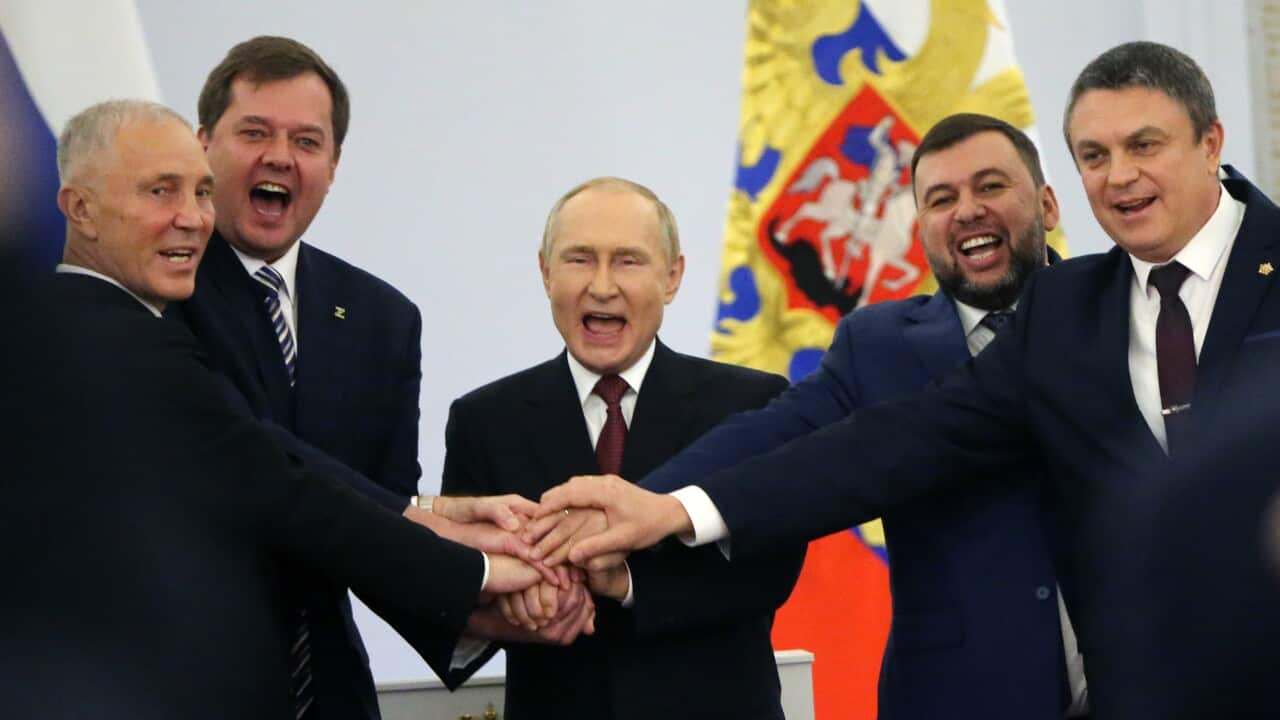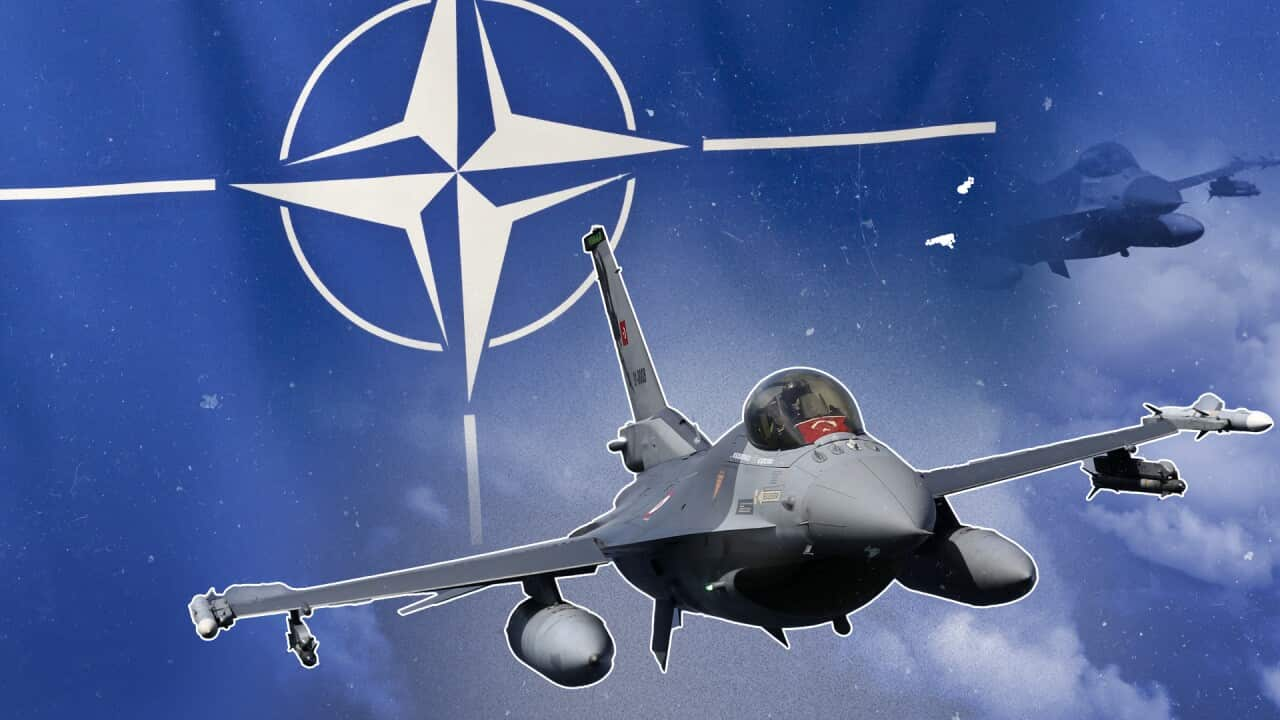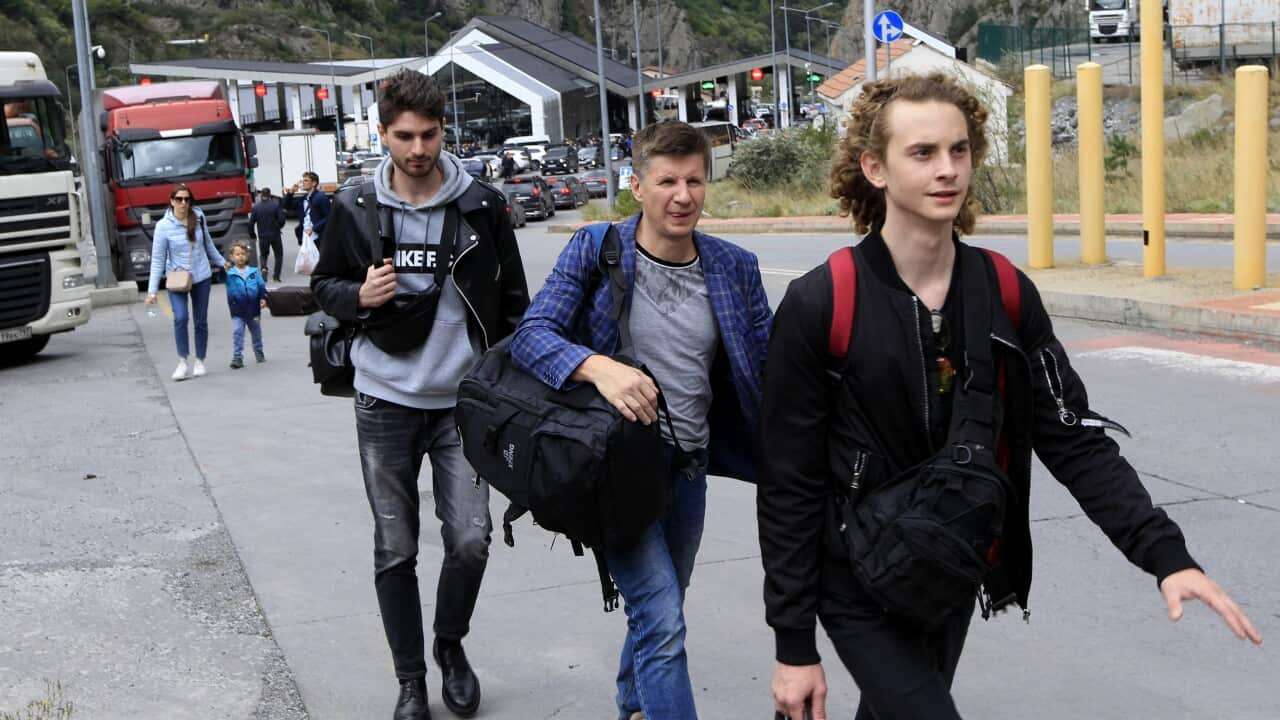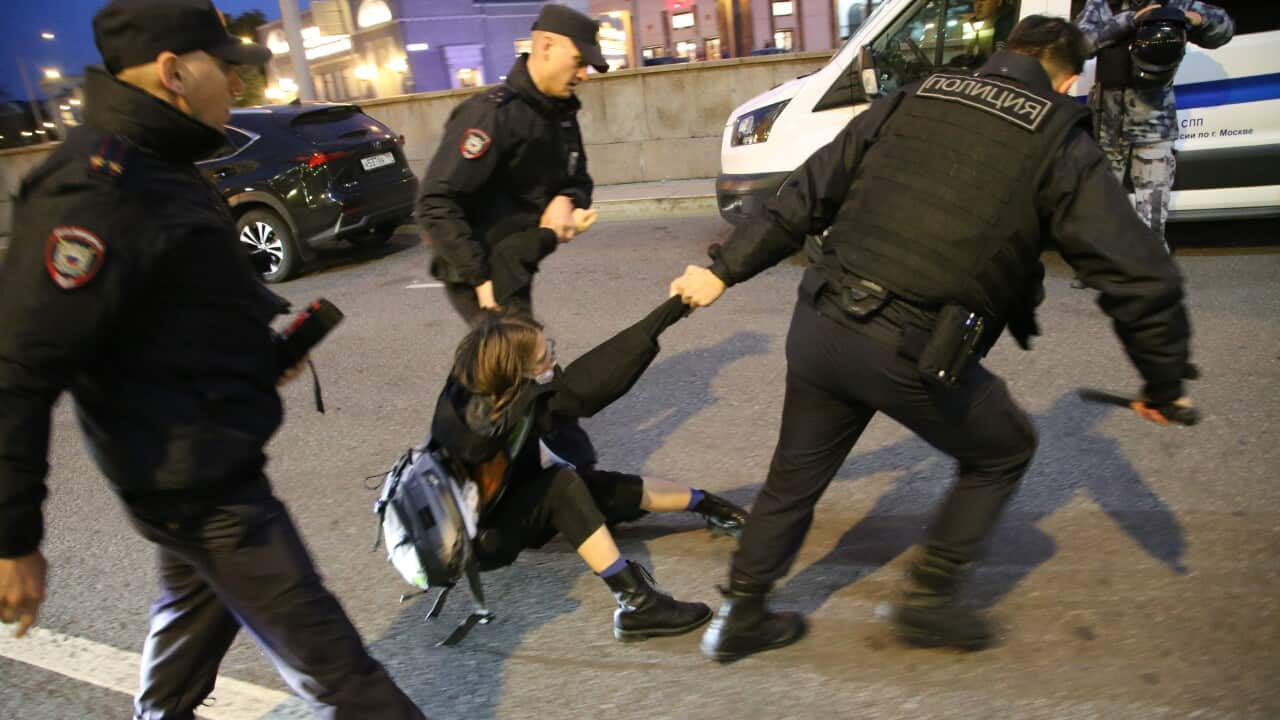Key Points
- Russia has celebrated the annexation of four territories from Ukraine after referendums that were branded a "sham"
- Here's what you need to know, and how the international community has reacted
Seven months after launching its "special military operation" in Ukraine, Russia has celebrated the annexation of four territories following by the international community.
Ukrainian president Volodymyr Zelenskyy accused Russia of redrawing borders "using murder, blackmail, mistreatment and lies", and several Western countries - including Australia - have introduced new sanctions against Russia.
But Russian president Vladimir Putin signalled that he would continue what he called a battle for a "greater historical Russia".
So why has Russia made this move and what does it mean for Ukraine, and the world?
What does Russia's Ukraine annexation mean?
In international law or war scenarios, annexation refers to one state proclaiming sovereignty over a territory that was previously part of another state.
Following annexation, the four regions of Donetsk, Luhansk, Kherson and Zaporizhzhia will now be considered part of Russia by those who accept Russia's referendums as legitimate.
By labelling the regions as Russian territory, Mr Putin is sending a message to both Ukraine and the West, ANU Strategic and Defence Studies Centre senior fellow Matthew Sussex told SBS News.
"One of the reasons it's given is that it's trying to create a pretext to say, 'this is Russian land now', so therefore, whatever the Ukrainians do against Russian land is a direct attack on the homeland rather than on some disputed territories," he said.
The move allows Mr Putin to "double down" and assert that Russia will "use any and all means to defend [the annexed regions]", Dr Sussex said.
"Partly that's a message to Ukraine, but it's also a message to the West," he said.
This is not the first time Russia has annexed a region of Ukraine.
In 2014, in the aftermath of the Maidan Revolution, Russia sent soldiers to Crimea to secure the region, and a referendum was held.
Authorities reported over 95 per cent of voters were in favour of joining Russia, but this referendum also led to international criticism and questions over legitimacy.
What happened in the referendums?
Over a five-day period from 23 - 27 September, residents in Luhansk, Donetsk, Kherson and Zaporizhzhia provinces voted on whether to officially join Russia.
During this period Russian soldiers reportedly went door-to-door to obtain votes, with the text on ballots written only in Russian.
Ukraine and its allies branded the votes a "sham", and accused Russia of coercing residents to vote.

Ukraine and its allies have branded Russia's referendum as illegitimate, saying residents were coerced into voting. Source: AAP / Sipa USA Kommersant
"Today we are making this choice. Residents of Donetsk and Luhansk People's Republics, residents of Zaporizhzhia and Kherson regions has made it (this choice)," he said.
"They have chosen to be with their people, to be with the Motherland, to live its destiny, to win together with it. We stand by the truth. We stand by Russia."
What does Ukraine say?
Mr Zelenskyy said Ukraine was formally applying for fast-track membership of the NATO military alliance, and would not engage in peace talks while Mr Putin was president.
The Ukrainian government also called for Australia to help build support in the Pacific as it looks for more international aid.
Ukraine's ambassador to Australia Vasyl Myroshnychenko said officials had asked their Australian counterparts to help expand a coalition of countries opposed to Russia's aggression.
"I believe we will repel the Russians, I believe we will restore our sovereignty ... it all now depends on our friends, including Australia, if we can get enough weapons and equipment to be able to evict the Russians from Ukraine," Mr Myroshnychenko told ABC TV on Saturday.
"(The) Ukrainian government has asked the Australian government to help us in the Pacific, and here in Southeast Asia as well, in engaging with the partners in the region, because we need to have a big coalition supporting Ukraine in our fight for freedom and democracy," he said.
Scores of civilians were killed and wounded on Friday in what Ukraine said was a Russian missile strike on a convoy of civilian cars.
"Thirty dead and 88 wounded as a result of another Russian war crime in Zaporizhzhia. Among the dead are two children: an 11-year-old girl and 14-year-old boy," Ukraine national police chief Igor Klymenko said.
Ukrainian troops now say they have taken the key bastion of Lyman in the Donbas region.
The Ukrainian soldiers made the claim in a video that was recorded outside the town council building in the centre of Lyman and posted on social media by Kyrylo Tymoshenko, deputy head of Mr Zelenskyy's office.
"Dear Ukrainians - today the armed forces of Ukraine ... liberated and took control of the settlement of Lyman, Donetsk region," one of the soldiers says. At the end of the video, a group of Ukrainian soldiers throw Russian flags down from the building's roof and raise a Ukrainian flag in their place.
Hours earlier Russia's defence ministry had announced it was pulling troops out of the area "in connection with the creation of a threat of encirclement".
How has Australia responded?
Foreign Minister Penny Wong and Attorney-General Mark Dreyfus on Sunday announced the Australian government will impose further costs on Russia for its "unilateral, illegal and immoral war on Ukraine".
Additional targeted financial sanctions and travel bans will be imposed on 28 Russian-appointed separatists, ministers and senior officials.
Australia has also filed an intervention in the International Court of Justice (ICJ) case brought by Ukraine against Russia, supporting Ukraine's claims Russia has violated the Convention on the Prevention and Punishment of the Crime of Genocide (Genocide Convention).
"These additional sanctions reinforce Australia's strong objection to the actions of President Putin and those carrying out his orders," Senator Wong said.
"The areas of Ukraine currently occupied by Russian forces are the sovereign territory of Ukraine. No sham referendum will change this."
What have other international reactions been?
The announcement of Russian rule over more than 15 per cent of Ukraine - the biggest annexation in Europe since World War II - has been roundly condemned by many countries, with the United States, Britain and Canada all announcing new sanctions.
US President Joe Biden condemned what he described as a "fraudulent" violation of international law.
"Russia is violating international law, trampling on the United Nations Charter, and showing its contempt for peaceful nations everywhere," he wrote in a statement.
"Make no mistake: these actions have no legitimacy. The United States will always honour Ukraine’s internationally recognised borders."
United Kingdom PM Liz Truss also accused Mr Putin of violating international law.
"The UK will never accept the regions of Donetsk, Luhansk, Kherson and Zaporizhzhia as anything other than Ukrainian territory," she said.
"The world must never accept your sham referendums or your cruel and illegal attempt to colonise Ukraine," he wrote.
"We stand with the people of Ukraine and will support them without flinching until their country is whole and free."

Russian president Vladimir Putin signed documents to annex four regions from Ukraine. Source: Getty
Ten out of 15 nations voted in favour of a US-Albania resolution condemning Moscow’s actions, but Russia exercised the veto power it holds as a permanent member.
China, India and several other nations abstained from voting.
Does this raise the threat of nuclear war, and what could happen next?
Russia's annexation has raised questions over whether it could lead to nuclear war.
Ukraine's recent successes have infuriated Mr Putin's allies such as Ramzan Kadyrov, the leader of Russia's southern Chechnya region, who said he felt compelled to speak out.
"In my personal opinion, more drastic measures should be taken, right up to the declaration of martial law in the border areas and the use of low-yield nuclear weapons," Mr Kadyrov wrote on Telegram.
Other top officials, including former president Dmitry Medvedev, have suggested Russia might need to resort to nuclear weapons, but Mr Kadyrov's call was the most urgent and explicit.
In a 37-minute speech on Friday Mr Putin vowed to defend his country and ensure the "new citizens" felt the "full support" of Russia - which some have viewed as a threat to use nuclear weapons.
"We will defend our land with all the powers and means at our disposal. And we will do everything to ensure the safe life of our people. This is the great liberation mission of our people," he said.
"Of course, we will work to improve the level of security, and together we will make sure that citizens in the new regions feel the support of the entire people of Russia, the entire country, all the republics, all territories and regions of our vast motherland."
Mr Putin also made what some perceived as a thinly-veiled threat to use nuclear weapons last week when he called up 300,000 reservists in a "partial mobilisation" and reiterated that his country would use "all available means” to protect its people.
Dr Sussex said this type of threat from Russia is not new.
"Russia has been waggling its nuclear weapons at Ukraine and the West since about 2008. So this is not a new development," he said.
"Even though the nuclear rhetoric has been amped up, there's still a question about whether or not you take that seriously ... in a way you have to because these are very, very destructive weapons."
"But I think you've got to wonder whether or not Putin is prepared to take that next step, because there are countries like China, for instance, who would find it really, really difficult to even tacitly support him if he did that".
In terms of what else could happen next, Dr Sussex said the annexations could be followed by increased attacks on Ukraine.
He said he expects to see the conflict continue to play out militarily.
"Normally, when there's a grand showy declaration by the Kremlin, it's accompanied by acts of violence, so I would expect increased attacks on Ukrainian infrastructure," he said.
"So the conflict effectively drags on."
With AAP

















